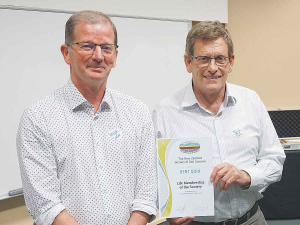Geopolitical shifts drive fertiliser market volatility – Ravensdown
According to Ravensdown's most recent Market Outlook report, a combination of geopolitical movements and volatile market responses are impacting the global fertiliser landscape.
 Dr Bert Quin (right) receiving his Life Membership of the NZ Soil Science Society late last year, for “Distinguished Service to Soil Science”.
Dr Bert Quin (right) receiving his Life Membership of the NZ Soil Science Society late last year, for “Distinguished Service to Soil Science”.
Quinfert owner, Bert Quin says his autumn fertiliser sales are nearly double last year’s.
This is despite farmer difficulties with the extended drought and getting their stock processed, not to mention complications arising from COVID-19.
He claims this a clear sign that more and more farmers are seeing through the “disinformation campaign” about Quinfert’s Algerian RPR, touted as an environmentally protective fertiliser<.
“It has longed been ranked one of the very best RPR’s internationally, in all the internationally used tests, and even more importantly, in field trials”, Quin says.
“Putting the hard facts forward in regular print advertising has had a large role to play in this”.
Quin believes farmers are becoming increasingly cynical about what they are being told by their regular supplier.
“They have been told for decades that soluble P doesn’t get lost in significant amounts to the environment in runoff or leaching. Now, with Quinfert appearing on the scene with its true RPR, farmers are being offered a drilling super type product as the saviour for the environment because it has far lower P losses than superphosphate,” he adds.
“Farmers were also told that high-performance RPR had become very hard to get.”
But Quin says that Algerian RPR had been available all the time and was offered to the industry.
Pāmu has welcomed ten new apprentices into its 2026 intake, marking the second year of a scheme designed to equip the next generation of farmers with the skills, knowledge, and experience needed for a thriving career in agriculture.
One team with 43 head, including a contingent from Mid Canterbury, are reflecting on a stellar NZ DairyEvent.
Fonterra farmer shareholders have approved the mechanism for a $2/share capital return expected from the sale of its global consumer and associated businesses.
Trainees in the horticulture industry studying towards a certificate or diploma can now apply for Horticulture New Zealand's (HortNZ) 2026 Industry Training Scholarships programme.
OPINION: The first three Global Dairy Trade (GDT) auctions have been a morale booster for farmers.
Former Fonterra executive Alex Turnbull has been appointed CEO to lead all five Yili Oceania Business Division companies in New Zealand.